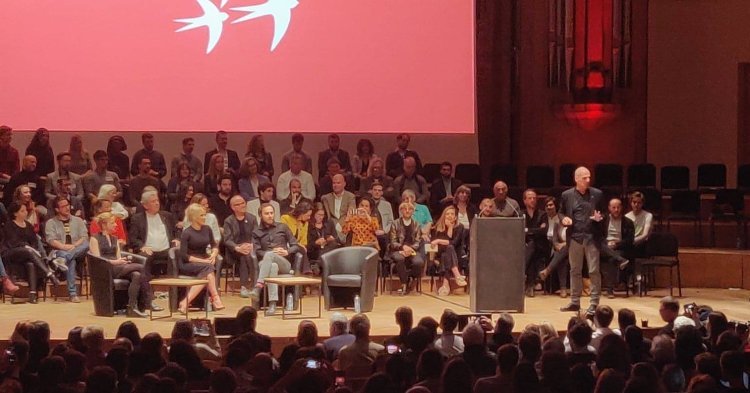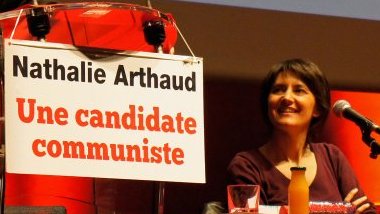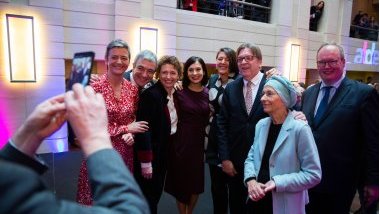What does being a “transnational” party mean?
The European Spring’s leaflet for the campaign launch event displayed the sentence, “Presenting the first-ever transnational list with one common political programme”. This phrasing is actually misleading: the European Spring is indeed a transnational party, but it is not a transnational list. A transnational list would be a unique pan-European list of candidates running in a Europe-wide constituency, and for which any European citizen would be able to vote, regardless of their nationality and the country where they vote. However, the European Parliament voted against the implementation of such lists for the 2019 elections.
However, it is true that the European Spring is a transnational party, meaning that it gathers candidates coming from various EU countries and running under the same European “label” (European Spring). The European Spring is a coalition of national political parties and candidates, but who share the same programme and campaign and will end up in the same political group in the European Parliament if they are elected.
The European Spring’s transnational dimension can also be found among its candidates, in the sense that some candidates running for one country are not necessarily nationals of this country. For example, one candidate is French but running in Belgium, and another one is a Croatian running in Germany. This reminds us of the right of European citizens to run for European (and local) elections in any European country.
Other parties, such as Volt Europa, also have this transnational and pan-European dimension. The European Spring is thus not the only “transnational party”, but is particularly attached to and proud of this part of its identity.
The European Spring: a grassroots movement away from professional politics?
Varoufakis opened the campaign event by saying that the European Spring’s vision of democracy is one of “a system for people who don’t necessarily think they have the answer, but try to crowdsource them”. Other candidates presented the European Spring as a grassroots movement, a citizen movement, as opposed to professional career-oriented politics. A fair number even affirmed that they did not want to be elected (as opposed to politicians who only seek positions), but that they decided to run for the elections because they wanted to be part of the change. Varoufakis also specified the need for a political turnover and for a non-renewal of electoral mandates, stating that when your term is over, you have to hand over to the next ones.
Regarding some candidates’ background, this description seems quite sincere: they are indeed “ordinary” citizens, who have never run in an election or held a political or elected position before.
For others, however, let’s not be naive: Benoît Hamon is a professional (and career-oriented?) politician. He ran for the French Socialist Party’s primaries and for the French presidential election in 2017 (which resulted in an unprecedented failure for the PS, with only 6.36% of the votes in the first round), was a government minister between 2012 and 2014, and an MEP between 2004 and 2009. In France, there is often the feeling that some French candidates run for the European elections only because they failed to get elected in a national position, and so that the EU elections only serve as an opportunity for them to “retrain” themselves.
Let’s not fool the voters: applying the “ordinary citizen”, “grassroots” or “non-professional politician” model to Benoît Hamon would be very out of place. Hamon, however, declared that the European Spring’s project was built as if it were the “most important national election”. Let’s hope his European commitment is sincere.
The European Spring’s opposition to the liberals’ and nationalists’ “two-faced authoritarianism”
The European Spring was born from the exasperation that only two choices were possible for Europe: that of “liberal pro-Europeans” or that of “nationalist Eurosceptics”. Varoufakis qualified this binary opposition as a “two-faced authoritarianism” and as the “partners of the same evil dance”.
Varoufakis started by recalling the 2008 economic and financial crisis which struck Europe, and especially the situation in his country, Greece, saying that “Europe had its 1929 moment again”. He especially highlighted the fact that the EU single market and currency were not designed to sustain the shockwaves coming from Wall Street, and that its weaknesses led to precipitating the crisis, both economically and socially, in Europe.
He also virulently accused the “establishment” of having put the burden of the failures of the financial actors and the banks on the shoulders of the weakest: the taxpayers and citizens. He mentioned the liberals alongside the social democrats in this regard. He denounced the “crime against logic” of having implemented “socialism for the bankers and austerity for the masses” and of having chosen to save a system that had proven to fail instead of reforming it.
Varoufakis, as well as most other European Spring’s candidates, criticised this cocktail of “technocrats”, “bad economics” and “toxic politics”, which “sowed the seeds of discontent” and “hopelessness” among many citizens, and led to the rise of far-right and populist parties across Europe, and to the growth of xenophobia, antisemitism, islamophobia or sexism. He mentioned AfD, Salvini, Golden Dawn, Kurz and Le Pen, among others.
The Greek candidate Erik Edman emphasised this point later, stating that austerity would not be remembered only as socially inhumane, but also as a dogma which doomed the environment and drove people to the far right. He then said that it was no time for petty reforms but for a “realistic”, “radical” and “unapologetic” change, and that only the EU is the place to deliver it.
Varoufakis considers that the “liberal establishment” personified by figures such as Merkel, Macron or Juncker has drawn its authority from facing Eurosceptics (such as Salvini or Le Pen), showcasing themselves as the only “pro-European” alternative in the face of rising nationalist Eurosceptic forces. But in Varoufakis’ opinion, Eurosceptics are the symptom of the “liberal authoritarian establishment”.
The European Spring then sees itself as “the only political force” standing against these two sides, and as the only contender in the European elections to have specific answers to today’s European challenges. Varoufakis, however, acknowledged the work done by the Greens, but reproached them to have focused exclusively on the environment and not on “human” aspects. Varoufakis declared that the European Spring aimed at “injecting humanity into politics”.
Improving transparency and reforming the EU
French candidates Emma Justum and Jacques Terrenoire expressed concrete ideas in terms of democratic steps to reform the EU. They called for a constitutional assembly in charge of drafting a new democratic Constitution for Europe, for a “meaningful political project for our common European home”. They stressed that the European Parliament should be the body to initiate and decide laws and regulations. They pledged for full transparency on decisions taken on our behalf.
Belgian candidate Laurent de Sutter also highlighted that for each person working in the EU institutions in Brussels (30,000 people), there is one person working for unregistered lobbies (30,000 people as well), including former EU officials. If Brussels is often seen as the “black box of Europe”, “let’s blow it off with the European Spring”, he declared.
Belgian candidate Rosita Allickx, for her part, stated that “transparency is the oxygen of democracy” and called for concrete measures, such as the creation of an anti-fraud office, legislation fully protecting whistleblowers, the ban of “golden visas” and “revolving doors”, or the end of tax havens.
Portuguese candidate Rui Tavares also stressed the need for more transparent and democratic processes, saying that it is not acceptable that we do not elect all our lawmakers, citing the European Commission, the ambassadors, the European Council, or the non-publicity of the Eurogroup meetings.
Justum and Terrenoire also pledged for more power and resources to be given to local authorities and municipalities, for them to be more involved in decision-making. They raised ideas such as changing the competition laws that restrict the possibilities of local governments, taking measures to re-municipalise services, reforming public procurement laws to allow local governments to better regulate their economy and to adopt sustainable and ethical policies. The candidates raised the idea of setting up a parliamentary committee in order to evaluate the sharing economy and its impact on local economy, and to help regulate it better. They wish to fight European laws preventing local authorities from welcoming migrants and helping them to integrate. “Confident societies don’t build fences, they bring them down,” Varoufakis said.
Spanish candidates Arantza Azmara Rodriguez and Maria Garzon Molina also pledged to end tax havens both inside and outside the EU, and to fight against the financing of terrorism and money laundering.
Environment, human rights, social justice, culture and education
Austrian candidate Daniela Platsch and Croatian candidate Srecko Horvat, running in Germany, introduced their project of a “Green New Deal for Europe”. Varoufakis highlighted the existence of €3 trillion in unused, yet not invested EU structural funds, and proposed the European Investment Bank to issue €500 billion per year in bonds in order to realise this Green New Deal.
Polish candidate Joanna Bronowicka insisted on the need to protect and improve women’s rights, LGBTI+ rights, minority rights and migrants’ rights. She stressed her will to implement policies to tackle the gender pay gap and impose an equal pay standard. Bronowicka raised the project to write a Convention on reproductive rights to guarantee that every woman has access to free and decent care everywhere in Europe. Moreover, she advocated a workers’ compact to make sure that every migrant worker is treated equally, no matter where they come from.
Portuguese candidate Joacine Katar Moreira urged for the need to have social justice in Europe, and that there can be no democracy in Europe without consideration for ethnic minorities, racial diversity and advancement towards true equity and equality.
The French candidate standing in Belgium, Marine Betrancourt, made a plea for accessible, free and high-quality education across Europe, for the promotion of vocational education and training, and for fostering European citizenship and intercultural understanding. She also called for fighting unpaid and underpaid internships, triggering the applause of the youth in the audience as such internships are indeed a plague faced by a lot of young people in Europe, including in Brussels where the event was taking place. “The EU cannot remain limited to a privileged few,” Betrancourt concluded




Follow the comments: |
|
